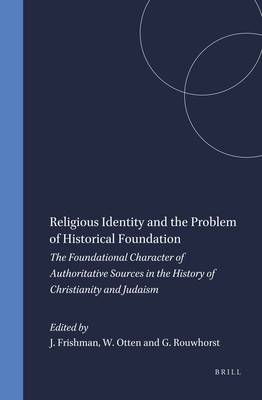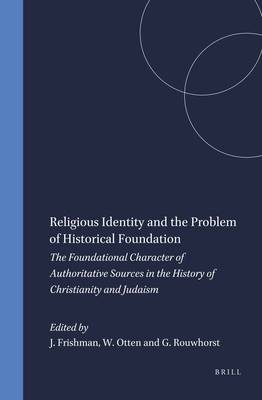
- Retrait gratuit dans votre magasin Club
- 7.000.000 titres dans notre catalogue
- Payer en toute sécurité
- Toujours un magasin près de chez vous
- Retrait gratuit dans votre magasin Club
- 7.000.0000 titres dans notre catalogue
- Payer en toute sécurité
- Toujours un magasin près de chez vous
Religious Identity and the Problem of Historical Foundation
The Foundational Character of Authoritative Sources in the History of Christianity and Judaism
398,45 €
+ 796 points
Description
The essays collected in this book deal with the question how, throughout the history of Christianity, Christian communities have tried to construct their identity by anchoring their views in authoritative and normative sources. The main focus is upon the problem of historical foundation through textual traditions but other authoritative sources ( role of religious leaders; ritual traditions) are taken into consideration as well.
The book takes as its point of departure the fact that with the rise of modernity the former dependence of western church and society on authoritative sources was called into question. Ever since, appeal to such sources is no longer self-evident; at times it is even regarded as problematic. Based on this radical change brought about by modernity, the book is divided in two main parts. The first part deals with the question how Christian churches and confessions ( Roman-Catholic and Protestant) confronted modernity and which role was played by authoritative sources in the tradition to the modern era. Special attention will be paid to the way in which Judaism reacted to many of the same impulses, both societal and religious ones. The second part deals with the premodern period, from early Christianity to the post-Reformation era, and focuses on the role authoritative traditions, textual or otherwise, have played in providing various Christian communities with a relative stable identity.
The aim of the book is to elucidate processes resulting in the formation of authoritative traditions as well as the effects of these traditions on the identity of Christian and Jewish communities. In addition, the book attempts to clarify the various ways in which Christian and Jewish communities have reacted to the growing suspicion authoritative traditions aroused in the western world since the rise of modernity.
The book takes as its point of departure the fact that with the rise of modernity the former dependence of western church and society on authoritative sources was called into question. Ever since, appeal to such sources is no longer self-evident; at times it is even regarded as problematic. Based on this radical change brought about by modernity, the book is divided in two main parts. The first part deals with the question how Christian churches and confessions ( Roman-Catholic and Protestant) confronted modernity and which role was played by authoritative sources in the tradition to the modern era. Special attention will be paid to the way in which Judaism reacted to many of the same impulses, both societal and religious ones. The second part deals with the premodern period, from early Christianity to the post-Reformation era, and focuses on the role authoritative traditions, textual or otherwise, have played in providing various Christian communities with a relative stable identity.
The aim of the book is to elucidate processes resulting in the formation of authoritative traditions as well as the effects of these traditions on the identity of Christian and Jewish communities. In addition, the book attempts to clarify the various ways in which Christian and Jewish communities have reacted to the growing suspicion authoritative traditions aroused in the western world since the rise of modernity.
Spécifications
Parties prenantes
- Editeur:
Contenu
- Nombre de pages :
- 600
- Langue:
- Anglais
- Collection :
- Tome:
- n° 8
Caractéristiques
- EAN:
- 9789004130210
- Date de parution :
- 29-01-04
- Format:
- Livre relié
- Format numérique:
- Genaaid
- Dimensions :
- 167 mm x 244 mm
- Poids :
- 1179 g

Les avis
Nous publions uniquement les avis qui respectent les conditions requises. Consultez nos conditions pour les avis.





